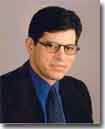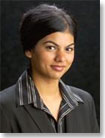The 2003 Hotel Industry CEO Survey
By Keith Kefgen & Anshuma Lal, HVS International
 Based on our pay-for-performance model, Jonathan Tisch was underpaid by nearly $1.56 million in 2003. The model takes into consideration EBITDA growth, market capitalization and stock appreciation, and compares that to total compensation.
Based on our pay-for-performance model, Jonathan Tisch was underpaid by nearly $1.56 million in 2003. The model takes into consideration EBITDA growth, market capitalization and stock appreciation, and compares that to total compensation. The lodging industry is making a fast turnaround from a very weak 2003. Occupancies are up, rates are too and multiples are moving for public lodging companies. Loews Corporation made one of the most impressive moves during 2003. As a conglomerate, Loews has made excellent investments in hotels, insurance, tobacco, energy and timepieces. The diversification helped Loews post solid results during the economic downturn started in 2001. Loews Hotels CEO, Jonathan Tisch not only runs the company hotel business but also assists in running the office of the president. He is probably one of the most active CEOs in the industry, and this year, his efforts paid big dividends.
The lodging industry is making a fast turnaround from a very weak 2003. Occupancies are up, rates are too and multiples are moving for public lodging companies. Loews Corporation made one of the most impressive moves during 2003. As a conglomerate, Loews has made excellent investments in hotels, insurance, tobacco, energy and timepieces. The diversification helped Loews post solid results during the economic downturn started in 2001. Loews Hotels CEO, Jonathan Tisch not only runs the company hotel business but also assists in running the office of the president. He is probably one of the most active CEOs in the industry, and this year, his efforts paid big dividends.
Top Performers
Based on our pay-for-performance model, Mr. Tisch was underpaid by nearly $1.56 million in 2003. The model takes into consideration three primary criteria, EBITDA growth, market capitalization and stock appreciation, and compares that to total compensation. The outcome is a pay-for-performance index that determines how much a CEO was over or under paid. Tisch has hovered near the industry average over the last few years but he outperformed his peers but a sizeable margin in 2003. Repeat top performers included Joseph P. Martori of ILX Resorts and Thomas Kitchin of Jameson Inns.
New names to the top 10 list included Jerry Herman of Arlington Hospitality, Minaz Abji at CHIP REIT, Arthur Coffey of WestCoast, John Davis at Pegasus, Leon Moore with Sholodge and Bob Winston at Winston Hospitality. With the exception of Tisch at Loews, small cap companies dominated with stronger upside growth and smaller compensation packages.
ADVERTISEMENT
Top Appreciators
The best investments over the past three years besides Loews included ILX, La Quinta, Choice, Cendant and Bluegreen. These companies had the best stock appreciation from December 2000 to December 2003. Cendant’s Henry Silverman might have won the best performing award this year if he would have taken a compensation package in the $5 million range rather a lofty $22 million. Silverman’s 2003 pay package made him the highest paid CEO, eclipsing Chris Nassetta of Host Marriott and Peter Rummell at The St. Joe’s Company by more than $10 million.
Top Salaries and Bonuses
The average CEO salary increased to $624,000 in 2003, a 14% increase over last year. We suspect the increase was in response to smaller long-term incentives being granted. Shareholders are showing a more combative posture towards what they perceive as excessive pay practices. The largest base salary was paid to Henry R. Silverman for the third year in a row. Rounding out the list of top salaries included Isadore Sharpe, J.W. Marriott Jr., Barry S. Sternlicht, Stephen Bollenbach and Michael D. Eisner. Each earned over $1 million in base salary.
Bonus compensation for hotel CEOs increased dramatically in 2003. At $1 million, the average bonus was more than double that of last year. Similar to salary increases, we believe that bonus schemes became a much larger part of compensation planning. With more shareholders scrutinizing stock option grants, many companies are moving more variable pay into bonus plans. Henry Silverman doubled his bonus payout again this year moving from $7 million to $14 million. Other large bonuses were paid to Michael Eisner, Barry Diller, Adam Aron and Barry Sternlicht.
Top Stock Incentives
The year 2003 saw a continued move away from stock options. Most of the largest long-term incentives consisted of restricted stock awards. Only 30% of the survey group received stock options compared to 60% just three years ago. Peter Rummell at The St. Joe’s Company received the largest stock grant worth more than $10 million. Other leaders in this category included, Frank Cash at La Quinta, Christopher Nassetta of Host Marriott, J.W. Marriott Jr. of Marriott International and Colin Reed with Gaylord Entertainment.
Richest CEOs
Two billionaires join Arison and Marriott this year, Barry Diller worth over $8 billion and Henry Silverman at $1 billion. The other wealthiest CEOs are Mr. Eisner and Mr. Sternlicht in the $500 million category. The biggest future paychecks appear to belong to the same cast of characters, with Diller at the head of the group with stock options worth more than $1 billion.
With Sarbanes-Oxley and other SEC regulations coming to the forefront, executive compensation continues to be a lighting rod issue for investors. The Richard Grasso lawsuit is another first, as the New York Stock Exchange looks to recover nearly $100 million it paid Grasso before his dismissal. Almost every day the business press is criticizing a Fortune 1000 CEO for excessive pay for mediocre or poor performance. Hotel industry CEOs should heed the warning because investors are not going to stand on the sidelines any longer and boards are not going to protect embattled CEOs, in fear of their own jobs.
——-

